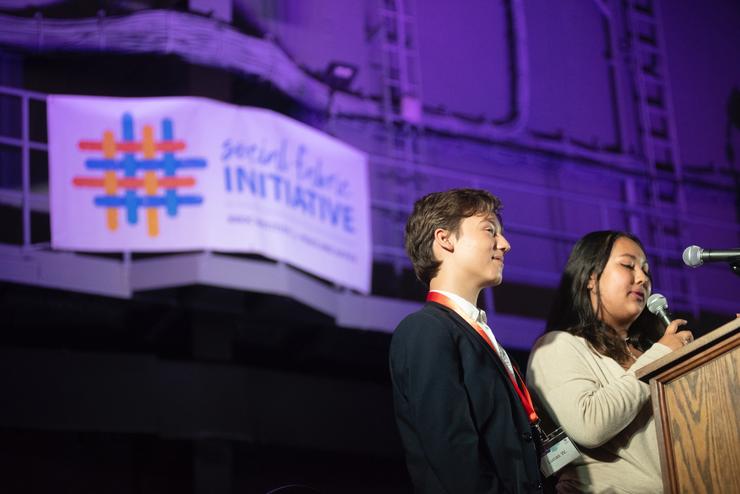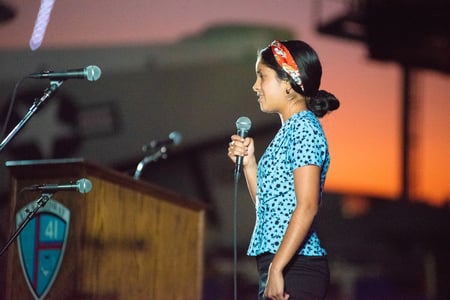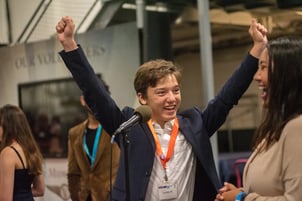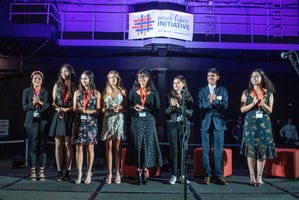The Importance of Fear and Failure: Lessons From the Social Fabric Initiative's Season 2 Summit

The Importance of Fear and Failure: Lessons From the Social Fabric Initiative's Season 2 Summit

begin quot
The following post was written and adapted by Tina Medina, Program Officer of the Kroc Institute for Peace and Justice, who delivered the closing remarks at the Social Fabric Initiative Summit Event aboard the USS Midway on August 21, 2019.
When I was 19, I decided to live on a ship. I had decided to leave my world behind and venture bravely into a totally new existence, living, studying, and traveling the world.
From the Amazon’s giant waterfalls to the favelas layered with poverty and people, and from giant golden Buddhas adorned with flowers and incense t
o a simple, concrete bench in an intimate little room with nuns praying on the other side of the curtain, and me with two friends and a cab driver we had just met an hour before, sitting quietly with Mother Teresa, gazing at her beautiful and ancient eyes, listening to her talk about our border region between San Diego and Tijuana.
We had gotten on a plane earlier that morning, not knowing what was in store for us but hoping that we’d eventually end up at the Taj Mahal. We were young, adventurous, and without a plan. And because we had no plan, we could not fail.
It wasn’t until decades later that I began to realize how important failure is to our growth and independence. Failure and fear, actually.
I might be a program officer in the peacebuilding field, a restorative educator, and a purpose-driven entrepreneur, but above all, I am a mom. In all my professional development and personal growth, nothing has taught me more about fear and failure than being a parent. And I’ve learned some valuable lessons along the way and I’ll share three of them with you.
The first is this:
There is no growth in comfort.

I was recently reminded of this when an unexpected turn of events delayed some of my own plans and projects. I got to completely shift gears, change my thinking, and readjust. It was painful, it was uncomfortable, it was exhausting, and it was critical for my own learning.
See, I’m kinda stubborn (ok, really stubborn), so sometimes I have to learn and relearn things until they sink in. The need to do things my own way and be a trailblazer can often lead to failure. Yet had it not been for this situation, I would not have truly realized the importance of self-love and nurturing my own needs.
I had poured everything into ONE goal and deadline, and when that shifted unexpectedly, my whole world titled and I felt my body falling apart. So here’s what I did to recover: I reached out to my mentors for support, I solicited guidance, I walked my dogs, and went swimming. I got back to my most elemental self, sat quietly and meditated, and journaled about my lessons. And then I shared them publicly because I needed to call out that fear.
We often talk about letting go of fear but I want to encourage us — all of us — to do the opposite. I want you to call it out, name it, and then carry it in your pocket and let that little bit of fear drive you to do the things you thought you couldn’t do, the things people tell you you’ll never be able to do, the things that the world may think impossible.
And that takes me to the next point:
Do something that scares you every single day.

I don’t mean walk into a scary forest where there may or may not be a guy with a mask and a chainsaw. Or even go on a blind date without telling someone where you’re going. That’s just stupid.
What I’m talking about is taking risks and trying new things, like playing dare — or even double dog dare — with your dreams. I’m always amazed when I talk with my clients about what their big dreams are and they look at me like I’m crazy because they stopped dreaming a long time ago. And now they can’t answer me.
I’ve realized that we stop dreaming at a very young age. Our ability to dream is thwarted by the demand to ask for permission.
We are taught in school to raise our hand to speak, share ideas, or even go to the bathroom. Then we plunge into a professional world run by clocks and deadlines and often a lack of human connection. We engage in social media to get approval of our life choices, only to be made fun of or mocked when we are honest about what we really want to do in this world, the impact we want to make.
So, I dare you to be relentless about your big dream and do something EVERY single day to move the needle on that dream, even if it scares you, and even if you fail.
Which brings me to my last point:
Failure is what allows us to up-level and be the best version of ourselves, to fulfill our purpose.

To all the young people reading this, here’s what I’d like to say to you: It’s OK to make a mistake. It’s OK for something to go differently than you expected. It’s OK for you to fall. It’s even OK for you to stay down for a while.
What’s not OK is that you stay down and don’t get back up. What’s not OK is for you to always stay in the safe zone because life is not in the safe zone.
And parents, educators, grandparents — all of you adulting — here’s what I’d like to say to you:
The same exact thing.
With one important addition. We must let them — the young people in our lives — we must let them fail. Bubble wrapping, helicoptering, protecting them from life’s hardships — we are causing more harm than good.
Trust me. I get it. My girls are my life. I absolutely hate seeing my two precious girls feel any kind of pain. It quite literally hurts my heart.
But I also know at one point soon — sooner than I even want to think about — they will be out in the world on their own, floating on their own ship. And I have made a conscious decision, a determination to raise two strong, decisive, intelligent, empathic, caring, creative, bold individuals equipped with the tools they need in order to reach their own definition of success. And guess what? That is not going to happen if I don’t let them fail.
So now, I bring us back to the closing of Season 2 of the Social Fabric Initiative, standing on the USS Midway on a late August evening, celebrating the targets we hit and the targets me missed.

This summer, our youth peace leaders and interns have been learning, leading, and leaning in. They have been organizing, networking, designing, implementing, and reflecting. For some Youth Peace Leaders like Maggie, they learned the power of empathy; for others like Endiya, they learned many definitions of activism; and for others, the truth about their privilege, the hardship of disappointment, and the struggle of team dynamics.


In closing, I would like to retell a short story that Diana shared during the SFI Summit in Tijuana. Diana and Ernesto, two of our Mexican Youth Peace Leaders, developed a project at an orphanage and their main goal was to make sure those kids knew that they were loved. They created a mural with the children and painted the hashtag #yoestoyaqui, meaning “I am here”.
At the Summit, Diana talked about how difficult it was working with children because they had so much energy. It was hard to get them to focus, concentrate, and complete tasks. It was frustrating and challenging but they stuck to their commitment and vision until they completed the project.
On the last day, when they were saying goodbye, all of the kids rushed her and hugged her so tightly that she fell over. She told the audience that despite the challenges, the hot sun, the hard work, the energetic children — she would do it all over again just to relive that single moment of love, appreciation, gratitude.
Just like so many of our Youth Peace Leaders this summer, she felt the power of making an impact.

The beauty of the Social Fabric Initiative is that there is a place for everyone. Whether you are young and inspired or mature and motivated, there are multiple ways you can engage with us and we are excited to meet you, celebrate you, and welcome you to the family.
To discover how you can collaborate with or support the Social Fabric Initiative, please contact Kroc IPJ Executive Director Andy Blum at andrewblum@sandiego.edu and follow us on Facebook and Instagram.
Contact:
Justin Prugh
jprugh@sandiego.edu
(619) 260-7573

About the Author
The Joan B. Kroc School of Peace Studies (Kroc School) at the University of San Diego is the global hub for peacebuilding and social innovation. Founded in 2007, the Kroc School equips the next generation of innovative changemakers to shape more peaceful and just societies. We offer master's degrees in peace and justice, social innovation, humanitarian action, conflict management and resolution, and a dual degree in peace and law — programs that have attracted diverse and dynamic students from more than 50 countries. In addition to our graduate programs, the Kroc School is home to the Kroc Institute for Peace and Justice (Kroc IPJ). Founded in 2001, the Institute supports positive change beyond the classroom. Through groundbreaking research, experiential learning, and forward-thinking programs, the Kroc School and Kroc IPJ are shaping a future in which peaceful co-existence is the new normal.





